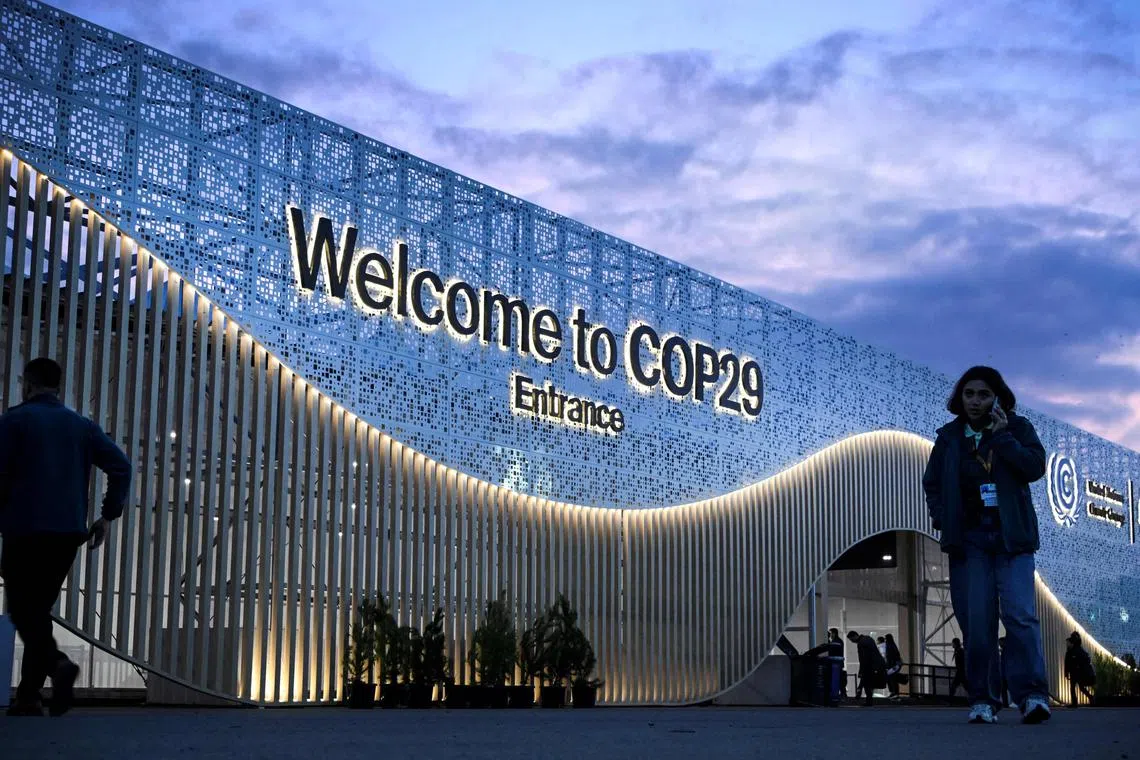Multi-nation teamwork key to reducing environmental conflicts: Vivian and Green Group ministers
Sign up now: Get ST's newsletters delivered to your inbox

The Green Group put out the statement as 2024 marks a year of three environment-related UN conferences
PHOTO: AFP
SINGAPORE - Effective management of natural resources across national borders will help to reduce resource scarcity and enable cooperation, thus reducing the risk of conflict between countries.
This was a key message from a Nov 11 statement by Foreign Minister Vivian Balakrishnan and four of his ministerial counterparts in the six-country Green Group – a multi-nation initiative that aims to promote green policies and solutions in international relations.
“Without coordinated and decisive global action, increasing resource scarcity and environmental degradation can escalate tensions, potentially triggering conflicts,” said Dr Balakrishnan and four ministers from Slovenia, Cabo Verde, Costa Rica and the United Arab Emirates in a statement on day one of the UN climate change conference (COP29). Iceland is also part of the Green Group.
Water is a major source of transboundary conflict between countries. In 2020, Mexican farmers seized a dam in its border state to prevent water from being diverted from their parched fields and sent to the US. They also ambushed hundreds of soldiers during the conflict.
“As essential resources like water often cross national boundaries, adopting a transboundary approach to their management is necessary to ensure fair and equitable access for all,” the ministers said.
As global climate pressures intensify, the need for innovative solutions and significant investments in water management becomes paramount, they added.
The Green Group put out the statement as 2024 marks a year of three environment-related UN conferences. While COP29 is under way in Baku, Azerbaijan,
“These three COPs are key forums that contribute to addressing the interconnected elements of the ongoing triple planetary crisis – biodiversity loss, climate change and pollution,” said the country leaders, highlighting that delegates at the conferences must ensure that policies and actions taken are timely and comprehensive in addressing the environmental challenges.
The ministers noted that addressing climate change and environmental issues requires global effort beyond any single country’s capabilities. Environmental challenges can influence each country’s peace and security.
“Since climate change exacerbates resource scarcity and extreme weather events, displaces communities and heightens the risk of conflict over vital resources such as water, land and food, it consequently deepens existing inequalities and weakens social resilience,” they added.
The Green Group cited nature-based solutions as a way to protect ecosystems while addressing social inequalities. For example, reforestation projects or the planting of mangroves can be helmed by local communities, and can also create jobs.
They also highlighted the role of young people and women in addressing the planetary crises. Existing inequalities make women the most vulnerable to environmental impacts, but having them step up as leaders and participate in climate action initiatives can help to create impact while tackling gender inequality.
The ministers also emphasised that climate finance must be available and accessible to developing countries to achieve their decarbonisation targets. This is a nod to COP29’s main deliverable, which is to adopt a global climate finance goal that will channel money from developed countries to less developed countries.
The amount of this finance pot will be the key political question on the negotiating table.
“Developed countries must continue leading efforts to mobilise resources, ensuring that financial mechanisms are transparent and equitable,” the ministers said.
They added that collaboration between the public and private sectors – with a focus on increasing private investment – will be key to accelerating innovative finance solutions for climate action.
In a pre-recorded message at the COP29 Singapore Pavilion’s launch on Nov 12, Minister for Sustainability and the Environment Grace Fu provided an update on a blended finance initiative launched at COP28, which aims to raise up to US$5 billion (S$6.7 billion) to de-risk and finance green projects in Asia.
Ms Fu announced that the Government will pledge up to US$500 million as concessional capital to match, dollar for dollar, other concessional capital from partners in this initiative, called Financing Asia’s Transition Partnership (Fast-P).
Concessional capital refers to loans, grants or equity investments offered at below-market rates. It is typically provided by multilateral funds, philanthropic organisations and government agencies to help soften investors’ risks in financing green projects, which can often be deemed too risky or unprofitable.
Fast-P involves the Monetary Authority of Singapore, multilateral development banks and philanthropic organisations among others.
“This combined pool of concessional capital will be used to crowd in commercial capital and other sources of finance to accelerate capital flows to support Asia’s green transition,” said Ms Fu.


